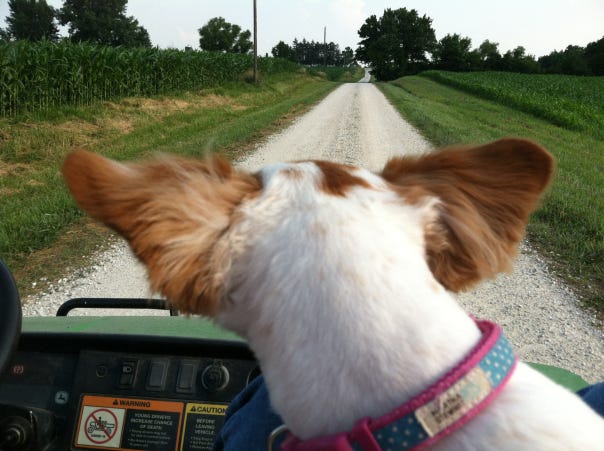Rural Reflections
“The chance you had is the life you've got. You can make complaints about what people, including you, make of their lives after they have got them, and about what people make of other people's lives...but you mustn't wish for another life. You mustn't want to be somebody else.” Wendell Berry in Hannah Coulter
After our Colorado trip and two days back in the office in Oklahoma City, we're here in Illinois wrapping up the last of our vacation days. Altogether, it's been a good and much-needed break from the past 18 months of school merging and managing, and I'm (almost) ready to jump back into things in earnest next week.
In the meantime, I'm making the most of our last few days here in Pike County where I - along with four previous generations of Dunhams - grew up on our centennial farm. Our girls love being here and connecting with their four Pike County cousins (I have two younger sisters who each have two kids of their own), Megan graciously tolerates the latest tales of townsfolk she has never met, and even our dog, Peaches, seems to have an affinity for the rural life (in particular the John Deere Gator rides, as shown above).
I love the farm. For as long as I can remember, it has meant much to me as a place, an anchor, a stopping-off point, a means of provision, a muse of creativity, a home…the list is endless. The stability of associating myself with a particular 600 acres of God’s green Earth is rare in today's transient world and has always mesmerized me in its value, both felt and perceived. Even when I didn’t want to be here, or thought there was no future in it for me here, I’ve always loved the farm...and I always will.
But then I ask myself, do I love the farm or do I love the idea of the farm? The answer to both questions is “yes,” which transforms the inquiry into one of degrees (i.e. which one do I love more?). That’s when things get confusing.
There was a time – when, for instance, I would plow the living room for hours on end as a five-year-old – that my family may have expected me to remain on or eventually return to the farm. At some point, though – exactly when, I don't know – they let go of that expectation most likely because I did. I remember being 16 and chomping at the bit to leave for college, to graduate and move to The Loop in downtown Chicago (to do what, I had no idea), and never look back. The desire did not spring from some dislike for the rural as much as a fascination for the urban; after all, as the post-WWI song goes, "How you gonna keep 'em down on the farm after they've seen Paree?"
I can’t say I ever felt direct pressure to "be about" the farm; chores (what little of them I had) never came before studies or school events, and farming was never cause for missing a game or performance or church as long as Saturday mornings were kept open for hog work. If anything, there were times in my early teens when I probably felt frustrated that I couldn’t do more to help out in the fields or on the bigger equipment in a more significant way, but God had his reasons, and my parents – perhaps seeing the writing on the wall before I did – acquiesced to those by supporting (and at times, directing) me in other endeavors.
As I've grown older, I confess that my pride in telling others of our family’s fifth-generation farm quickly erodes even before the end of the sentence when, inevitably, I know the next question that's coming: “So what’s going to happen to the farm?” Many times I have felt guilty at being the only son or (though I would not trade any of my daughters for all the farms in the world) that my Y chromosomes couldn’t figure things out enough to produce a male heir to carry on the Dunham name and take to farming more than I did. Neither feeling is fair, but guilt (in particular the self-inflicted kind) does not play by the rules.
As much as the thought of returning to Pike County can be nostalgically attractive, I've yet to figure out how to make it happen practically; it would seem I have very little of what it takes to "make it" in the country. While the urbanite wrongly assumes that those living outside city limits are somehow "less than" because they haven't made it to the city, he would never survive in rural America, which is why he doesn't try beyond buying some minuscule weekend/vacation acreage upon which his existence does not depend.
I think of Thomas Jefferson's words concerning agriculture and those who practice it:
"Cultivators of the earth are the most valuable citizens. They are the most vigorous, the most independent, the most virtuous, and they are tied to their country and wedded to its liberty and interests by the most lasting bands."
Jefferson's sentiment describes my father and my grandfather; it does not, however, describe me, a truth that at times grieves my heart and disturbs my thoughts. There is no solution or salve for this affliction, save only the choice to still care and the decision to still visit, both of which seem trite compared to the calling and effort of my forebears to sustain this land over the past 100+ years so that I might still engage with it now.
As predominant a sculptor as any in my life, the farm - as a tool in the sovereign hands of God - seems to have shaped me for something other than itself. It's no secret that I'm eternally grateful for this, but it is also a reality that saddens me some nevertheless.




